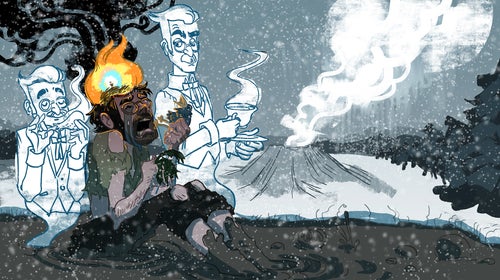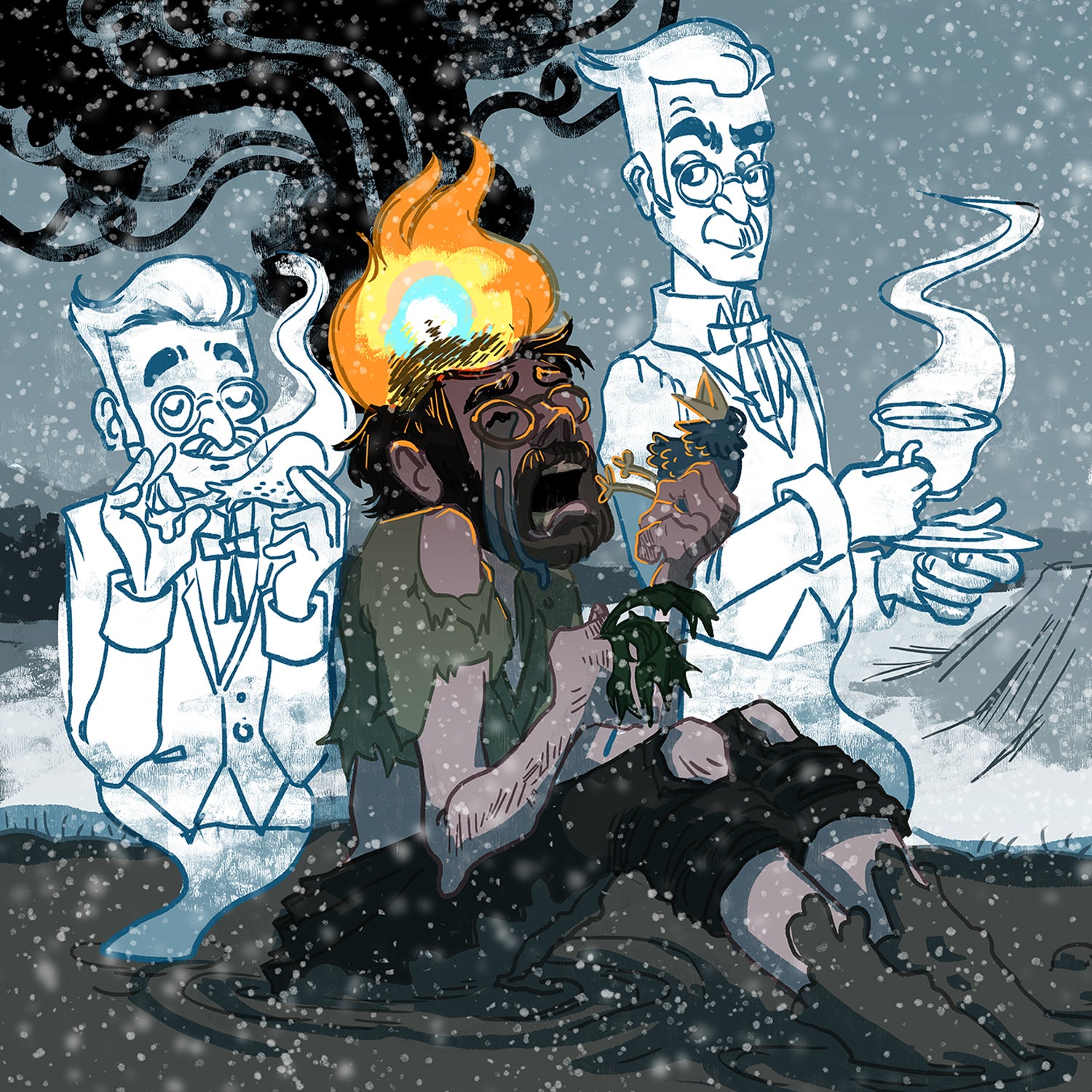Truman Everts awoke from his bed of pine needles stiff and alone. It was September 10, 1870, and a typical late summer day in the northern Rockies—sunny and warm��with a chance of snow flurries. Everts, a 54-year-old bureaucrat from the Montana Territory was 120 miles south of Bozeman, in a corner of the newly created Wyoming Territory that was, for all intents and purposes, terra incognita. The pure wilderness upon which Everts gazed—towering waterfalls, columns of steam rising hundreds of feet in the air, and pines as far as the eye could see—was one of the last remaining blank stretches on the map of the continental United States. And, though he refused to admit it to himself, Everts was lost.��
Three weeks earlier, 19 Montana explorers, including Everts, had taken it upon themselves to finally map “the Yellowstone country,” as the region was called. Since the days of Lewis and Clark, mountain men and trappers had been spinning tall tales about a part of the Rockies filled with boiling lakes, spitting geysers, and petrified forests. The men, several of whom would become , called themselves the Washburn Expedition. With the aid of a few U.S. Army soldiers, they vowed to explore this “strange and marvelous” uncharted land, according to Nathaniel Langford, the expedition’s organizer and the future first superintendent of Yellowstone National Park who��wrote about the expedition in Scribner’s Monthly later that year. The judges and generals on the trek would name mountains, hunt for the source of the Yellowstone River, and carry out some of the last true exploration in the lower 48.��
“Our company, composed of some of the officials and leading citizens of Montana, felt that if the half [of the tall tales of the region were] true, they would be amply compensated for all the troubles and hazards of the expedition,” Langford wrote.
Everts, however, was no explorer, and the “troubles and hazards” he faced on the expedition, in Langford’s words, would become the stuff of campfire legend and national fascination,��according to Yellowstone National Park historian Lee��Whittlesey��who wrote a book about Everts’ exploits in the 1995 book��
A desk-jockey all his life, Everts had run the Montana Territory’s Internal Revenue department in Helena for the past five years. The Grant administration wanted its own man collecting taxes in Montana, though, and by the summer of 1870, the taxman had been unemployed for seven months. Enamored with the idea of exploring the unknown with Montana’s fellow leading citizens, the middle-aged widower enthusiastically joined the Washburn Expedition. The jaunt into the unknown was to be “sort of a between-jobs vacation for him,” Whittlesey says. Little did Everts know his holiday would become a comic wilderness odyssey—think The Revenant meets National Lampoon’s Vacation—of grit, luck, and utter incompetence that would, against all odds, help lead to the creation of the nation’s first national park.
Daylight broke over Everts’ sad pine-needle bed a little before 7:00 am. Though he was wholly lost, Everts was not particularly worried. The career bureaucrat had fallen behind the expedition the evening before—a trail clogged with fallen trees and his profound nearsightedness were apparently to blame—and decided to make camp once night fell. Despite the discomfort, Everts, a man of limitless confidence and self-assurance, later wrote that he “had no doubt of being with the party at breakfast.”��
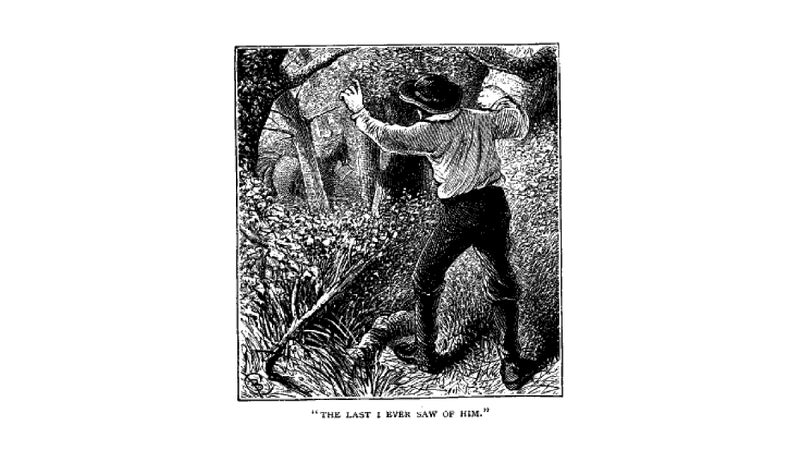
Though Everts had lived the last five years on the frontier in Montana, he had little experience roughing it. A Vermont native, Everts spent the Civil War tending to wounded Union soldiers and, , was politically savvy enough to be appointed federal Tax Assessor of the new Montana Territory by Abraham Lincoln. As the first rays of sunlight began to cast shadows in the great pine forest, Everts lowered himself from his horse—his eyesight was so poor he needed to dismount frequently to search the ground for signs of the expedition—left the mare unhitched, “as had always been my custom,” and ambled off into a clearing. Moments later he heard a crack and turned in horror to see his horse “disappearing at full speed among the trees.” With the animal went his blankets, guns, fishing tackle, matches, food, and canteens—just about everything he’d brought with him. Desperate, he stumbled after the horse, but the creature was out of his sight within moments.
Everts’ cheery disposition quickly faded. Anxiety gave way to alarm as he faced the prospect of another night alone in the woods—this time without fire, food, or shelter. He took stock of his inventory: two butcher knives, an opera glass, and the light clothes he was wearing. “Naturally timid in the night, I fully realized the exposure of my condition,” he wrote.��
A cold night and another day passed with no sign of the expedition. Unable to hunt or fish, Everts’ hunger became unbearable. He began wandering blindly along the southern shore of Yellowstone Lake, trying to retrace his steps to find his companions. The next day, delirious with hunger, he saw the sails of a ship on the horizon above the lake and ran to the shore, overjoyed. But he soon deflated, realizing he’d placed his hopes on a large pelican skimming the water. He became “quite unmanned,” and broke down.��
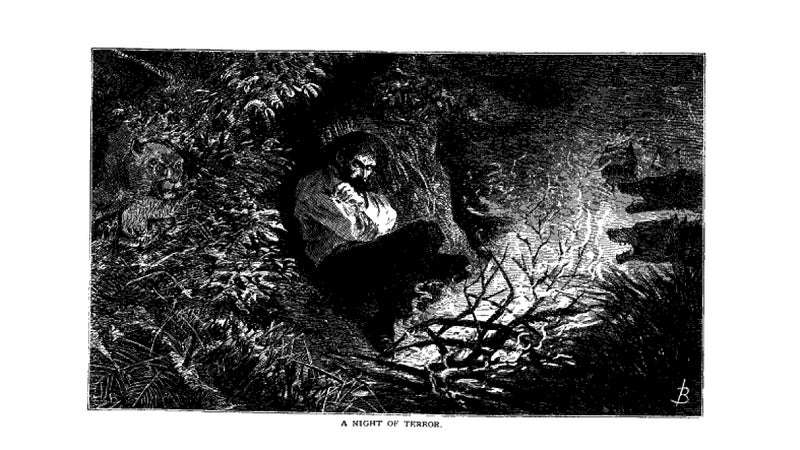
That night, probably the 13th of September, Whittlesey thinks, as Everts shivered under a tree, a mountain lion began to stalk him. Everts, terrified and weak, was also defenseless: he’d lost both of his remaining knives in the bush earlier in the day. He scrambled up the pine and, “clasping the trunk of the tree with both arms, I sat perfectly still,” he wrote. “Moments passed with me like hours” and he spent the night thinking of his beloved daughter, Elizabeth, the belle of Helena society, about to be orphaned.
The next morning, a snowstorm blew in.��
Although the United States was approaching its centennial, the Mountain West of the country was still sparely populated and mysterious in 1870. Montana, essentially frontier land with some very promising gold and silver mines, wouldn’t become a state for 19 years; Wyoming had officially become a Territory just two years earlier. The Washburn Expedition was the first professional effort to chart the unmapped northwestern quadrant of the new Wyoming Territory. “Everybody knew there was something weird in the northern Rockies,” says Montana State University historian Kim Allen Scott, an expert on the expedition. “But nobody really knew what was in those particular mountains. It lent a mystique to it.”
A smaller excursion into what is now Yellowstone a year earlier had piqued interest in region, but the Washburn Expedition was to be a serious affair. Henry Washburn, a former congressman and general in the Union Army, was the Surveyor General for the Montana Territory and his party included some of the most respected citizens on the country’s northern frontier. Everts had signed on early, eager for the adventure, along with Warren C. Gillette, a young man very much enamored with Elizabeth Evert who considered himself Truman’s future son-in-law. ��
The “Yellowstone country,”��at the time, was still a mystery to Americans. Though people from 26 different tribes had lived off the land , few whites had ever seen the geysers and hot springs.��The stories whiskered trappers brought back from the region seemed fantastical. Even as Everts and the rest of the expedition made their way up the Yellowstone River, the explorers had their doubts. “A column of steam rising from the dense woods to the height of several hundred feet, became distinctly visible,” wrote Lt. Gustavus C. Doane, an army officer with the expedition, in a report that would become required reading in Washington. “We had all heard fabulous stories of this region and were somewhat skeptical as to appearances…Some one noticed that the vapor rose in regular puffs, and as if expelled with a great force. Then conviction was forced upon us. It was indeed a great column of steam, puffing away on the lofty mountainside, escaping with a roaring sound, audible at a long distance even through the heavy forest. A hearty cheer rang out at this discovery and we pressed onward with renewed enthusiasm.”��
Weeks later, according to the late historian Aubrey Haines, the expedition stumbled across a stunningly large, startlingly regular geyser. Mesmerized, they dubbed it “Old Faithful.” A short way down the Firehole River, the group built a campfire and, rumor has it, declared that the region should be preserved as a national park, which would make it the first in the world. In the coming months and years, the members of the expedition would go on to play integral roles in the founding of the park—even Everts, who, by this time, the entire expedition assumed had frozen to death.��
Everts��had been crawling for an unknown number of days. He had lost his shoes, broken his glasses, and weighed no more than 50 pounds. His feet were worn to the bone and he was black with burns and frostbite.��
Everts’ first meal in five days came on wings benumbed by cold. Lying under a tree as a blizzard blanketed the region, a small, confused songbird landed right in front of him. “I instantly seized and killed it, and, plucking its feathers, ate it raw,” he wrote. “It was a delicious meal for a half-starved man.” ��
With the September storm raging, Everts abandoned hope of being found by his fellow explorers. He stumbled through what he estimated were ten miles of mush and snow—park historian Whittlesey puts it at closer to three or four—until he found a collection of hot springs at the foot of what he called . Freezing and soaked through, he lay down beside the blistering springs for warmth. There he stayed for seven days, waiting out the snow. He’d discovered he could eat a local thistle (now known as the ) and began boiling them in a nearby spring, which he called his dinner pot. He sharpened a belt buckle from his vest into a knife, made a fishhook from a pin and created a line from some string he found in his pocket. “I was enveloped in a perpetual steam-bath,” he wrote. “At first this was barely preferable to the storm, but I soon became accustomed to it, and…actually enjoyed it.” Three nights into his stay at the hot spring, however, Everts rolled over in his sleep and directly on to a vent. The scalding his received on his hip would become the cause of “unceasing pain.”��
Around this time, Everts realized he could make fire with his opera glasses by concentrating the sun’s rays. The glorious discovery boosted his spirits immensely and allowed him to leave his hot spring den. But in stormy late September, the sun didn’t always shine and Everts was terrified to let his fire die. Now, as he prepared for a 100-mile journey north, hobbled by frostbitten feet—he’d turned his shoes into slippers as they began to fall apart—he would resolve to carry a branch lit by fire all the way.��
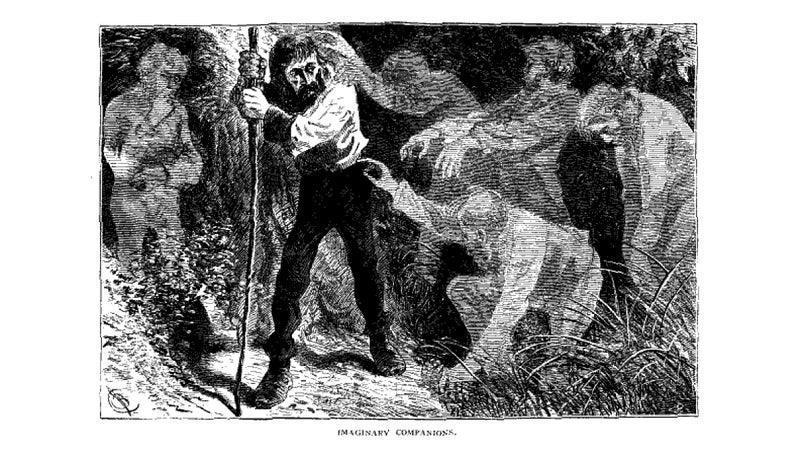
At this point, Everts had survived two weeks alone in the frigid wild, subsisting on nothing but a songbird and thistles. Gaunt and nearly mad with hunger, the days blended together. He spent half a day trying to catch a grasshopper and failed. The third degree burn on his hip from the hot spring meant he could only sleep sitting up; one night, as he nodded off, he fell forward and directly into his campfire, burning his hand. His mind began to escape him. Old friends appeared, counseling him on which direction he should take. “My arms, legs and stomach were transformed into so many traveling companions,” he wrote. “For hours I would plod along conversing with these imaginary companions.” The disembodied spectral version of his stomach “complained incessantly of the roots I fed him;” his legs “implored me for rest.” He grew to like his hallucinations and rely on them. “I was constantly traveling in dream-land, and indulging in strange reveries such as I had never known before.”��
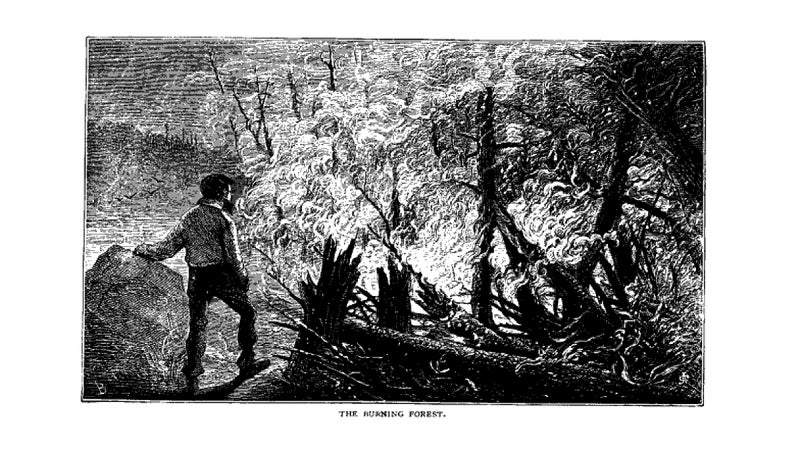
A few days later, white caps and foam on Yellowstone Lake signaled the wind was picking up. Worried about another sleepless night in the cold, Everts collected pine branches, stacked them to create a small shelter and lit a cracking fire. He awoke some indeterminate time later to a wall of flames. His shelter and the surrounding trees were a roaring blaze and much of his hair had burned off in his sleep. He sprinted toward the water, but “on, on, on traveled the destructive element, until it seemed as if the whole forest was enveloped in flame.”
Scorched but alive, he realized he’d left behind his few remaining possessions. “Among the disasters of this fire, there was none I felt more seriously than the loss of my buckle-tongue knife, my pin fish-hook and tape fish-line.”��
The next day, the ghost of an old friend appeared and suggested Everts follow the Yellowstone River out of the region. “Delighted with the idea of having a traveling companion,” he pushed the thoughts of death from his mind and plodded on. A day or so later, he came across a warm spring filled with minnows and, drinking deeply and eating the fish raw, quickly succumbed to violent food poisoning.
The expedition spent a full week searching for Everts. They set signal fires at night, fired guns into the air each day and left notes and caches of food for Everts along the lake. The man courting Everts’ daughter Bessie, Warren Gillette, stayed out all night hunting for his potential father-in-law and was, at one point, within four miles of Everts, according to Lost in Yellowstone. The party had discussed what to do if a member was lost and agreed to a meeting point along Yellowstone Lake, but Everts, for reasons unknown, never appeared.��
On the “gloomy morning” of September 17th, a week after Everts’ disappearance, the expedition finally moved on. Gillette and two soldiers stayed behind for another three days, to no avail. ��
“Has he met death by accident, or may he be injured and unable to move, and be suffering the horrors of starvation and fever?” wondered Langford, the future park superintendent. “Has he wandered aimlessly hither and thither until bereft of reason? As I contemplate all these possibilities, it is a relief to think that he may have lost his life at the hand of some vagabond Indian.”
Jack Baronett raised his rifle and prepared to fire. Baronett, a gold prospector who panned in the upper Yellowstone country, was on the trail of a wounded bear. It was October 16—37 days since Everts’ disappearance—and his dog had picked up the scent of the beast first. Now, as he took sight of the bruin, he paused. “When I got near it, I found it was not a bear, and for my life could not tell what it I was. It did not look like any animal that I had seen, and it was certainly not a human being,” he later told an author. ��
Everts had been crawling for an unknown number of days. He had lost his shoes, broken his glasses, and weighed no more than 50 pounds.��His feet were worn to the bone and he was black with burns and frostbite. Looking up from the hillside, he saw the sharp reflection of burnished steel. “Are you Mr. Everts?” someone asked. “Yes. All that is left of him,” he replied and fell into his savior’s arms.
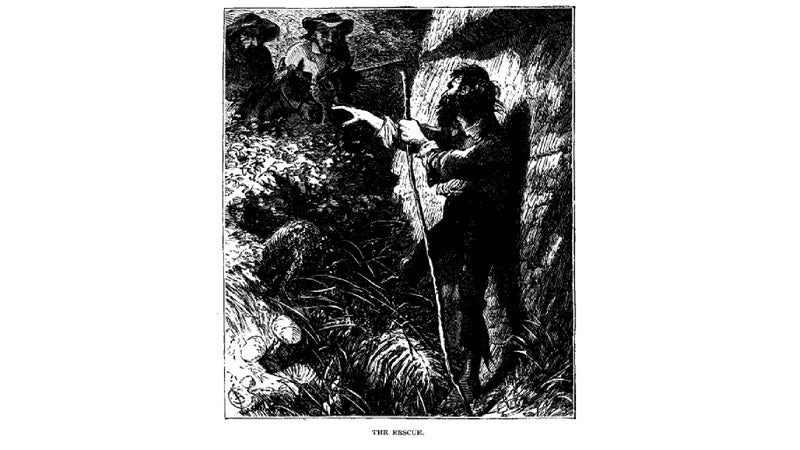
Baronett and another mountain man had been hunting for Everts. The Washburn expedition had already returned to Montana and a prominent judge had offered a reward for anyone who found Everts’ remains. Unbelievably, the pair had stumbled across the man himself—a full 50 miles from where he had first been lost. (Contrary to Everts’ account of his rescue, Baronett says Everts mumbled incoherently when found and was “constantly delirious” for days; he was also incapable of holding down new food—the fibrous “Everts thistles” had apparently backed him up—until he was given a laxative of pure bear fat. “All in all,” writes Whittlesey, “he was a thoroughly wasted and irrationally being.”) ����
The story of Everts’ improbable survival became national news. His rescuers took him to Bozeman, where he recuperated and wrote a riveting firsthand account of the ordeal for Scribner’s Monthly, “Thirty-Seven Days of Peril.” The episode lent “great publicity and support to that burgeoning movement” to establish a national park at Yellowstone, Whittlesey writes, and combined with a national lecture tour by Langford, the country became fascinated with the mysterious, boiling lands. In 1872, after one final expedition photographed the Yellowstone basin, the country’s first national park was created by an act of Congress. Everts, by this time fully recovered, was offered the honor of becoming first superintendent. He declined, citing the job’s lack of pay, and the role went to Langford, the expedition’s organizer.��
Everts eventually left the frontier and moved back East. He took a job with the U.S. Post Office and settled back into obscurity. He would die 30 years later, of pneumonia, at his home in Hyattsville, Maryland.��
��
Today, a hundred years after the founding of the National Park Service, Everts is little remembered for his role in the creation of the country's national park service. Perhaps it's because Everts, after his safe return, rarely talked about his ordeal, according to descendants interviewed by Haines and Whittlesey.��Case in point: When Jack Baronett, Everts’ rescuer, visited the bureaucrat in New York��a few years after the ordeal, Everts��was so rude that��the mountain man, upon leaving the meeting, said he “wished he had let the son-of-a-gun roam.”��Baronett, for his part, never received his reward for Evert’s rescue, either. The Montana judge who offered the $600 bounty said it was Everts’ job to pay since he was found alive.����
Everts flatly refused.��
“He would not pay me,” Baronett recounted, “because he said that if I had left him alone he would have found his way out.”
